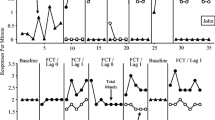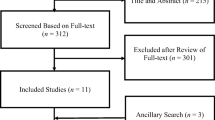Abstract
Ample research indicates that functional communication training (FCT) is an effective intervention to reduce challenging behavior. The purpose of this study was to evaluate the effect of demand fading on escape-maintained challenging behavior, mands, and task completion for 2 children with autism spectrum disorder. The study utilized an embedded reversal and alternating-treatments design to evaluate the efficacy of the intervention and compare the efficacy of the demand fading and dense schedule conditions. During FCT, participants were taught 2 mand topographies, one of which was associated with demand fading. FCT with and without demand fading resulted in decreases in challenging behavior for both participants. FCT with demand fading resulted in higher task completion for both participants. The effect of demand fading on the rate of mands varied by participant. Results provide further support for the use of FCT. The importance of intervention fading in the treatment of challenging behavior is discussed.




Similar content being viewed by others
References
Berg, W. K., Ringdahl, J. E., Ryan, S. E., Ing, A. D., Lustig, N., Romani, P., et al. (2015). Resurgence of mands following functional communication training. Mexican Journal of Behavior Analysis, 41, 166–186. https://doi.org/10.5514/rmac.v41.i2.63747.
Berg, W. K., Wacker, D. P., Harding, J. W., Ganzer, J., & Barretto, A. (2007). An evaluation of multiple dependent variables across distinct classes of antecedent stimuli pre and post functional communication training. Journal of Early and Intensive Behavior Intervention, 4, 305–333. https://doi.org/10.1037/h0100346.
Briggs, A. M., Fisher, W. W., Greer, B. D., & Kimball, R. T. (2018). Prevalence of resurgence of destructive behavior when thinning reinforcement schedules during functional communication training. Journal of Applied Behavior Analysis, 51, 620–633. https://doi.org/10.1002/jaba.472.
Carr, E. G., & Durand, V. M. (1985). Reducing behavior problems through functional communication training. Journal of Applied Behavior Analysis, 18, 111–126. https://doi.org/10.1901/jaba.1985.18-111.
DeLeon, I. G., & Iwata, B. A. (1996). Evaluation of a multiple-stimulus presentation format for assessing reinforcer preferences. Journal of Applied Behavior Analysis, 29, 519–533. https://doi.org/10.1901/jaba.1996.29-519.
Epstein, R. (1985). Extinction-induced resurgence: Preliminary investigations and possible applications. The Psychological Record, 35, 143–153. https://doi.org/10.1007/bf03394918.
Fuhrman, A. M., Fisher, W. W., & Greer, B. D. (2016). A preliminary investigation on improving functional communication training by mitigating resurgence of destructive behavior. Journal of Applied Behavior Analysis, 49, 884–899. https://doi.org/10.1002/jaba.338.
Gerow, S., Davis, T., Radhakrishnan, S., Gregori, E., & Rivera, G. (2018). Functional communication training: The strength of evidence across disabilities. Exceptional Children, 85, 86–103. https://doi.org/10.1177/0014402918793399.
Gratz, O. H., Wilson, A. N., & Glassford, T. (2019). Evaluating the resurgence of problem behavior with three functionally equivalent discriminated operants. The Psychological Record, 69, 117–129. https://doi.org/10.1007/s40732-018-0305-0.
Hagopian, L. P., Boelter, E. W., & Jarmolowicz, D. P. (2011). Reinforcement schedule thinning following functional communication training: Review and recommendations. Behavior Analysis in Practice, 4, 4–16. https://doi.org/10.1007/bf03391770.
Hagopian, L. P., Fisher, W. W., Sullivan, M. T., Acquisto, J., & LeBlanc, L. A. (1998). Effectiveness of functional communication training with and without extinction and punishment: A summary of 21 inpatient cases. Journal of Applied Behavior Analysis, 31, 211–235. https://doi.org/10.1901/jaba.1998.31-211.
Hagopian, L. P., Toole, L. M., Long, E. S., Bowman, L. G., & Lieving, G. A. (2004). A comparison of dense-to-lean and fixed lean schedules of alternative reinforcement and extinction. Journal of Applied Behavior Analysis, 37, 323–338. https://doi.org/10.1901/jaba.2004.37-323.
Hartley, S. L., Sikora, D. M., & McCoy, R. (2008). Prevalence and risk factors of maladaptive behaviour in young children with autistic disorder. Journal of Intellectual Disability Research, 52, 819–829. https://doi.org/10.1111/j.1365-2788.2008.01065.x.
Hoffman, K., & Falcomata, T. S. (2014). An evaluation of resurgence of appropriate communication in individuals with autism who exhibit severe problem behavior. Journal of Applied Behavior Analysis, 47, 651–656. https://doi.org/10.1002/jaba.144.
Horner, R. H., & Day, H. M. (1991). The effects of response efficiency on functionally equivalent competing behaviors. Journal of Applied Behavior Analysis, 24, 719–732. https://doi.org/10.1901/jaba.1991.24-719.
Iwata, B. A., Dorsey, M. F., Slifer, K. J., Bauman, K. E., & Richman, G. S. (1994). Toward a functional analysis of self-injury. Journal of Applied Behavior Analysis, 27, 197–209. (Reprinted from Analysis and Intervention in Developmental Disabilities, 2, 3–20, 1982). https://doi.org/10.1901/jaba.1994.27-197.
Kennedy, C. H. (2005). Single-case designs for educational research. Boston, MA: Pearson Education.
Lalli, J. S., Casey, S., & Kates, K. (1995). Reducing escape behavior and increasing task completion with functional communication training, extinction, and response chaining. Journal of Applied Behavior Analysis, 28, 261–268. https://doi.org/10.1901/jaba.1995.28-261.
Lattal, K. A., & St. Peter Pipkin, C. (2009). Resurgence of previously reinforced responding: Research and application. The Behavior Analyst Today, 10, 254–266. https://doi.org/10.1037/h0100669.
Lieving, G. A., & Lattal, K. A. (2003). Recency, repeatability, and reinforcer retrenchment: An experimental analysis of resurgence. Journal of the Experimental Analysis of Behavior, 80, 217–233. https://doi.org/10.1901/jeab.2003.80-217.
Marsteller, T. M., & St. Peter, C. C. (2014). Effects of fixed-time reinforcement schedules on resurgence of problem behavior. Journal of Applied Behavior Analysis, 47, 455–469. https://doi.org/10.1002/jaba.134.
Mildon, R. L., Moore, D. W., & Dixon, R. S. (2004). Combining noncontingent escape and functional communication training as a treatment for negatively reinforced disruptive behavior. Journal of Positive Behavior Interventions, 6, 92–102. https://doi.org/10.1177/10983007040060020401.
O’Neill, R. E., Horner, R. H., Albin, R. W., Sprague, J. R., Storey, K., & Newton, J. S. (1997). Functional assessment and program development for problem behavior (2nd ed.). Pacific Grove, CA: Brooks/Cole Publishing.
Padilla Dalmau, Y. C., Wacker, D. P., Harding, J. W., Berg, W. K., Schieltz, K. M., Lee, J. F., et al. (2011). A preliminary evaluation of functional communication training effectiveness and language preference when Spanish and English are manipulated. Journal of Behavioral Education, 20, 233–251. https://doi.org/10.1007/s10864-011-9131-z.
Radhakrishnan, S., Gerow, S., & Weston, R. (2019). Resurgence of challenging behavior following functional communication training for children with disabilities: A literature review. Journal of Developmental and Physical Disabilities. Advance online publication. https://doi.org/10.1007/s10882-019-09685-1.
Roane, H. S., Falcomata, T. S., & Fisher, W. W. (2007). Applying the behavioral economics principle of unit price to DRO schedule thinning. Journal of Applied Behavior Analysis, 40, 529–534. https://doi.org/10.1901/jaba.2007.40-529.
Stephens, C. E., Pear, J. J., Wray, L. D., & Jackson, G. C. (1975). Some effects of reinforcement schedules in teaching picture names to retarded children. Journal of Applied Behavior Analysis, 8, 435–447.
Tiger, J. H., Hanley, G. P., & Bruzek, J. (2008). Functional communication training: A review and practical guide. Behavior Analysis in Practice, 1, 16–23. https://doi.org/10.1007/bf03391716.
Volkert, V. M., Lerman, D. C., Call, N. A., & Trosclair-Lasserre, N. (2009). An evaluation of resurgence during treatment with functional communication training. Journal of Applied Behavior Analysis, 42, 145–160. https://doi.org/10.1901/jaba.2009.42-145.
Wacker, D. P., Harding, J. W., Berg, W. K., Lee, J. F., Schieltz, K. M., Padilla, Y. C., et al. (2011). An evaluation of persistence of treatment effects during long-term treatment of destructive behavior. Journal of the Experimental Analysis of Behavior, 96, 261–282. https://doi.org/10.1901/jeab.2011.96-261.
Wacker, D. P., Harding, J. W., Morgan, T. A., Berg, W. K., Schieltz, K. M., Lee, J. F., & Padilla, Y. C. (2013). An evaluation of resurgence during functional communication training. The Psychological Record, 63, 3–20. https://doi.org/10.11133/j.tpr.2013.63.1.001.
Wong, C., Odom, S. L., Hume, K. A., Cox, A. W., Fettig, A., Kucharczyk, S., et al. (2015). Evidence-based practices for children, youth, and young adults with autism spectrum disorder: A comprehensive review. Journal of Autism and Developmental Disorders, 45, 1951–1966. https://doi.org/10.1007/s10803-014-2351-z.
Author information
Authors and Affiliations
Contributions
Stephanie Gerow, Department of Educational Psychology, Baylor University Waco, Texas; Supriya Radhakrishnan, Department of Educational Psychology, Baylor University; Tonya N. Davis, Department of Educational Psychology, Baylor University Waco, Texas; Abby Hodges, Department of Teaching and Learning Sciences, University of Denver CO; Amy Feind, Northwest Independent School District Fort Worth, TX.
The authors would like to thank Gabby Rivera, Christy Prawira, Nicole O’Guinn, and Lauren Uptegrove for their assistance with data collection.
Corresponding author
Ethics declarations
Conflict of Interest
The authors declare that they have no conflict of interest.
Ethical Approval
All procedures performed in studies involving human participants were in accordance with the ethical standards of the institutional and/or national research committee and with the 1964 Helsinki declaration and its later amendments or comparable ethical standards.
Informed Consent
Informed consent was obtained from parents/legal guardians of all individual participants included in the study.
Additional information
Publisher’s Note
Springer Nature remains neutral with regard to jurisdictional claims in published maps and institutional affiliations.
Research Highlights
• Demand fading with functional communication training (FCT) consists of systematically increasing the number of tasks required prior to providing function-based reinforcement for the communicative response.
• Previous research supports the use of demand fading as a schedule-thinning procedure for escape-maintained challenging behavior.
• Practitioners should consider implementing FCT with demand fading to reduce escape-maintained challenging behavior and increase task completion.
• Demand fading alone may not be sufficient to reduce the resurgence of challenging behavior following the intervention. Therefore, practitioners should consider implementing FCT over an extended period of time to prevent the resurgence of challenging behavior.
Rights and permissions
About this article
Cite this article
Gerow, S., Radhakrishnan, S., Davis, T.N. et al. A Comparison of Demand Fading and a Dense Schedule of Reinforcement During Functional Communication Training. Behav Analysis Practice 13, 90–103 (2020). https://doi.org/10.1007/s40617-019-00403-z
Published:
Issue Date:
DOI: https://doi.org/10.1007/s40617-019-00403-z




